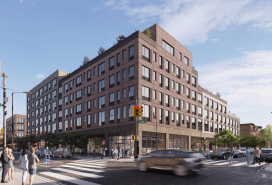7 steps to getting a mortgage by your 30th birthday

Updated, 3:39 pm: I wish I could say that I had never picked up one of those “Buy a House with No Money Down and No Credit!!!” books. In fact, I wish I could say I had only picked one up once and promptly laughed it off. For someone like me, who had very little money or credit history, the only place that homeownership seemed possible was in the pages of those books—and certainly not on the streets of New York.
At 27, when I finally surrendered my freelance lifestyle for the constraints of a 9-to-5, it dawned on me that if I could stay gainfully employed at the same job for about two years, I might finally work up the credit score and savings necessary to maybe, just maybe, buy something (anything!) in the city. It was going to be a long haul, but it was important to me to have a home in the city. A place I could hang art, entertain friends and eventually, raise a family.
Now, at 29, I’m in the process of buying a multi-family house in the Bronx and recently received a pre-approval for a mortgage. I’m not a real estate expert, and I haven’t signed a deal yet. But I’m also not a trust-funder, and I’m ready to buy. Here’s how I did it:
Step 1: Work a “real” job for 24 months.
If you’re like me and you prefer sleeping in and working until 2 a.m. on some kind of creative project, two years in the daily grind may sound like a life sentence to hard labor. But it has its benefits. One of them is that a bank will make you a loan much more easily when you show a documented source of regular income. Strictly speaking, it’s not necessary to earn a salary to get a mortgage; freelancers do get loans. But it’s much more difficult.
In May 2012, I had just returned to New York after riding my motorcycle across the United States and then living in Rio De Janeiro for six months. I was penniless and renting a room for $500 a month.
Trying to string together a living as a freelance photographer, I ended up at B & H, the well-known electronics store, to get prices on a few items I needed. The store was full of foreigners, speaking mostly Portuguese and Spanish, ravenous to buy photography equipment. After living abroad and, at home, in predominantly Hispanic neighborhoods, I speak Spanish and Portuguese at, basically, an expert level. So I did the logical thing; I abandoned the idea of freelance photography and applied for a sales job.
When I started, my salary came to about $37,000 per year. After two years of raises and working some overtime, my income falls between $65,000 and $75,000 per year. More than the average New Yorker to be sure, but not as much as you might think you'd need to buy a house. The stability of the income source and the fact that it is regularly increasing overtime is just as important to the bank as the amount itself.
Step 2: Stay out of debt.
I didn’t make much money through my early twenties but I did one thing right—I didn’t go into debt. When I did use my credit cards, I always paid them off in full every month. I attended some college but paid for it with scholarships or grants, so I escaped student loans. (Incidentally, a college degree escaped me.) In general, if I couldn’t pay for something right away, I didn’t buy it.
And I didn't splurge. After I had been at my job for a few months, I really wanted to buy a piano. After pricing them out, I figured that the model I wanted sold for about $1,800 dollars, plus another $100 or so in moving expenses. Instead of putting it on my credit card or blowing a few months of savings on a piano right away, I saved and shopped for 14 months and finally bought the same model in perfect condition on Craigslist for $600.
Although you can get a mortgage even if you’re not debt-free, it will be easier to get a loan—and qualify to borrow more funds—if you pay down all unproductive debt, i.e. credit cards and any student loans that can reasonably be paid off in a short time. So get started as soon as possible.
Step 3: Have four sources of credit for at least two years each.
This one almost did me in. I have two credit cards that I use at least once per billing cycle. I always pay them off in full. Once or twice a year, I ask for reasonable increases on my credit limits: When it comes time to apply for a mortgage, I want the loan officer to see that my credit card companies see me as credit-worthy and regularly increase my limit. I thought I was the absolute model of good credit.
And then, when my loan officer called to follow up after looking at my mortgage application, she said that even though my credit score was 797, the bank would turn me down unless I could show two more lines of credit. Huh?
Thankfully, the bank was willing to consider my lease and utility bills as “alternative credit sources,” but I could have made things easier by having a third credit card and some kind of installment loan (i.e. car loan, student loan, etc).
Your experience may be different, depending on what type of mortgage you're getting and what bank you're working with. Still, it can’t hurt to have at least four verifiable sources of credit (as long as you don't go crazy with debt; see No. 2).
Step 4: File your taxes.
While I worked freelance, I kept track of all my work-related expenses so that come tax time, I could itemize my expenses and keep my tax liabilities in check. Once I started working and having my taxes withheld by my employer, it was tempting to claim the same types of itemized deductions and maximize my return.
This may not be the best strategy in the year or two preceding your mortgage application. In the bank’s eyes, they will see these itemized deductions, no matter how legitimate, as a reduction in your overall income. This in turn will affect the amount of money the bank is willing to loan you. If you have a really high income, this may not cause any problem for you. But if you have an average income, it may be best to skip those deductions for a few years. You’ll pay a little more in the short run, but get more house in the long run.
To qualify for a loan, you’re going to need to show the last two years of tax returns, or three for some first-time homebuyers. I started my job in October 2012. When I applied for my mortgage in January 2015, I had been at my job for about 26 months and could show tax returns for 2012, 2013 and a W2 for 2014 with the understanding that I would have my tax return before I went into contract on a house. The bank let me slide on this requirement for now, but you’ll be better off with your tax returns ready to go.
Step 5: Pinch your pennies.
If you are like me and the biggest liquidity event you can expect in life is forgetting a $10 bill in your winter coat and then finding it the following year, you’re going to have to do a lot of saving for your down payment, typically at least 20 percent of the price of a home (more in the case of many co-ops). For first-time home buyers, it's sometimes possible to make smaller down payments with different state or federal programs. I used a program called SONYMA, which allows for a 3 percent down payment.
Still, I had to save up. For me, that meant waking up every Wednesday morning (payday!) and making an immediate transfer to my savings account. Do not pass go, do not collect $200—just make the transfer to your savings account and forget about it. I also do some freelance work as a photographer and put that money towards a down payment.
Personally, I love saving. Instead of setting aside a certain percentage or dollar amount, I tend to calculate my absolutely necessary expenses on a weekly basis, add $50 to $100 for things like clothes and entertainment, and save the rest. That means I started by putting away about $200 per week two years ago. As my salary increased, I have increased the amount I save to $350 to $500 per week.
In talking to my loan officer about how much cash I would need, she recommended planning on a 3 percent down payment for the SONYMA loan and 6 percent for closing costs. So if I were to buy a $400,000 house, which falls near the top of the range of what I can afford, I need to have $36,000 plus a reserve fund of about $6,000 left after the purchase. Depending on your situation, you may qualify for down payment assistance, which would decrease the overall total you need to save.
Step 6: Keep good records.
My mother taught me not to swear, but 55 minutes in the Time Warner store waiting for a simple printed copy of my billing statement just about undid all her teaching. Save yourself hours of frustrating phone calls, emails and in-person visits trying to get documents together by simply keeping everything.
If you want to talk about how to save more money, call me. How to improve your credit? Email me. Want to talk houses? Just come on over! But if you’re looking for advice on how to stay organized, count me out. I know it is important but I still struggle to keep my documents organized. Bank accounts and credit card accounts are easy because you can get them online 24/7. I’m working to be better organized with everything else. If you have a method that works for you, I’m all ears.
Here is a basic list of things you should keep:
- Tax returns
- W2s
- Paystubs
- Rent receipts
- Leases
- Utility bills
- Phone bills
- Internet bills
The more documentation you have, the easier the pre-approval process will be. Try to have everything printed out and organized. And a word to the wise: Never submit your original copies of anything even if the loan officer says they will return them! No matter how much you trust your loan officer, you don’t want to sacrifice your flexibility. If you were to go into contract on a house and then your loan officer withdraws their pre-approval for any reason, you may have only a few days to find an alternate lender. Always have original documents ready in case you need to re-submit them.
Step 7: Remember, it’s a marathon, not a sprint.
Getting pre-qualified for a mortgage is the first step in buying a home. But to me, it is also validation that my financial choices hold up under some scrutiny. Even if I don’t choose to buy in the near future, I’m now prepared to snatch up an awesome house when it comes along.
I’ll turn 30 this year and sometime in the not too distant future, I want to have a family. I’m neither a suburbs guy nor a raise-a-family-in-an-apartment kind of guy, so buying a house in the city makes sense for me. By focusing on this now, I hope that, whatever happens, I’m free to focus more time and energy on my friends and family later down the line. Oh yeah, and I really want a backyard with a bar-b-que.
Related:
The millennial's guide to getting a mortgage
The top hurdles to getting a mortgage--and how to overcome them
A 7-step guide for the under-25 buyer
The 3-percent-down mortgage you've never heard of that's available in NYC


























